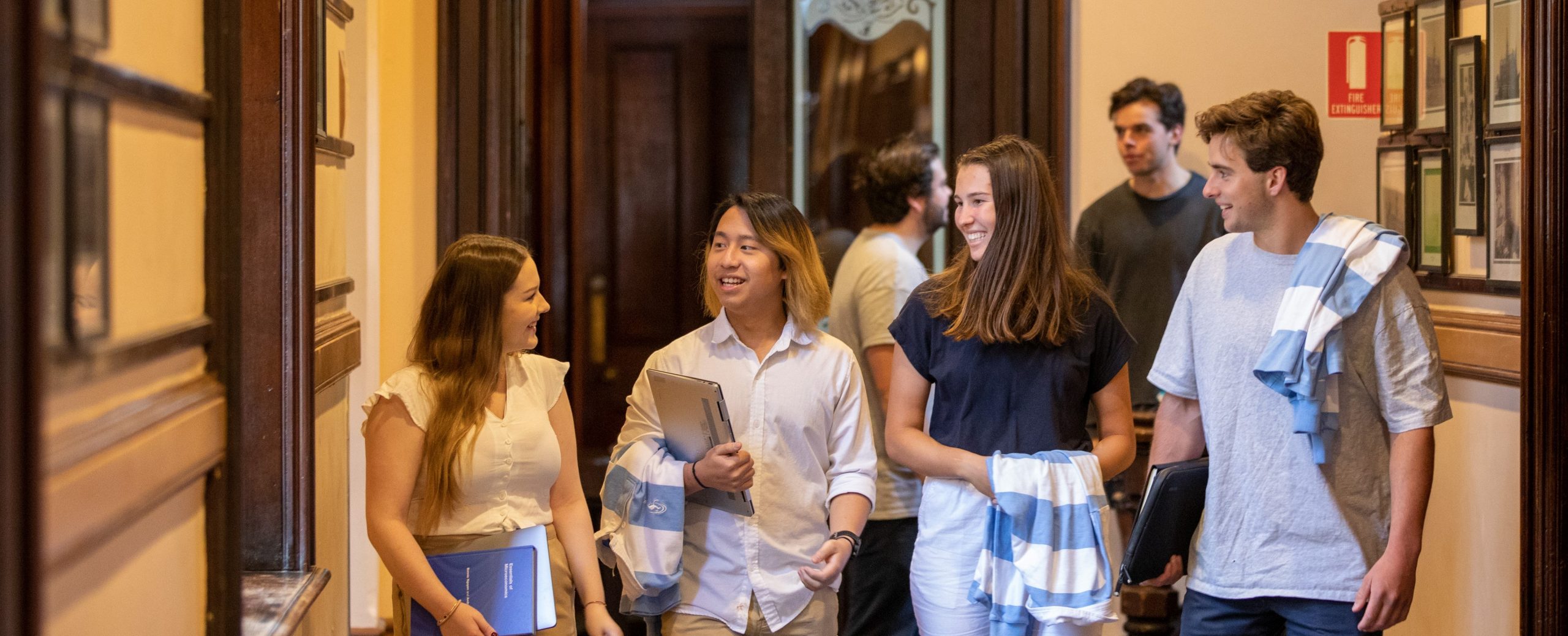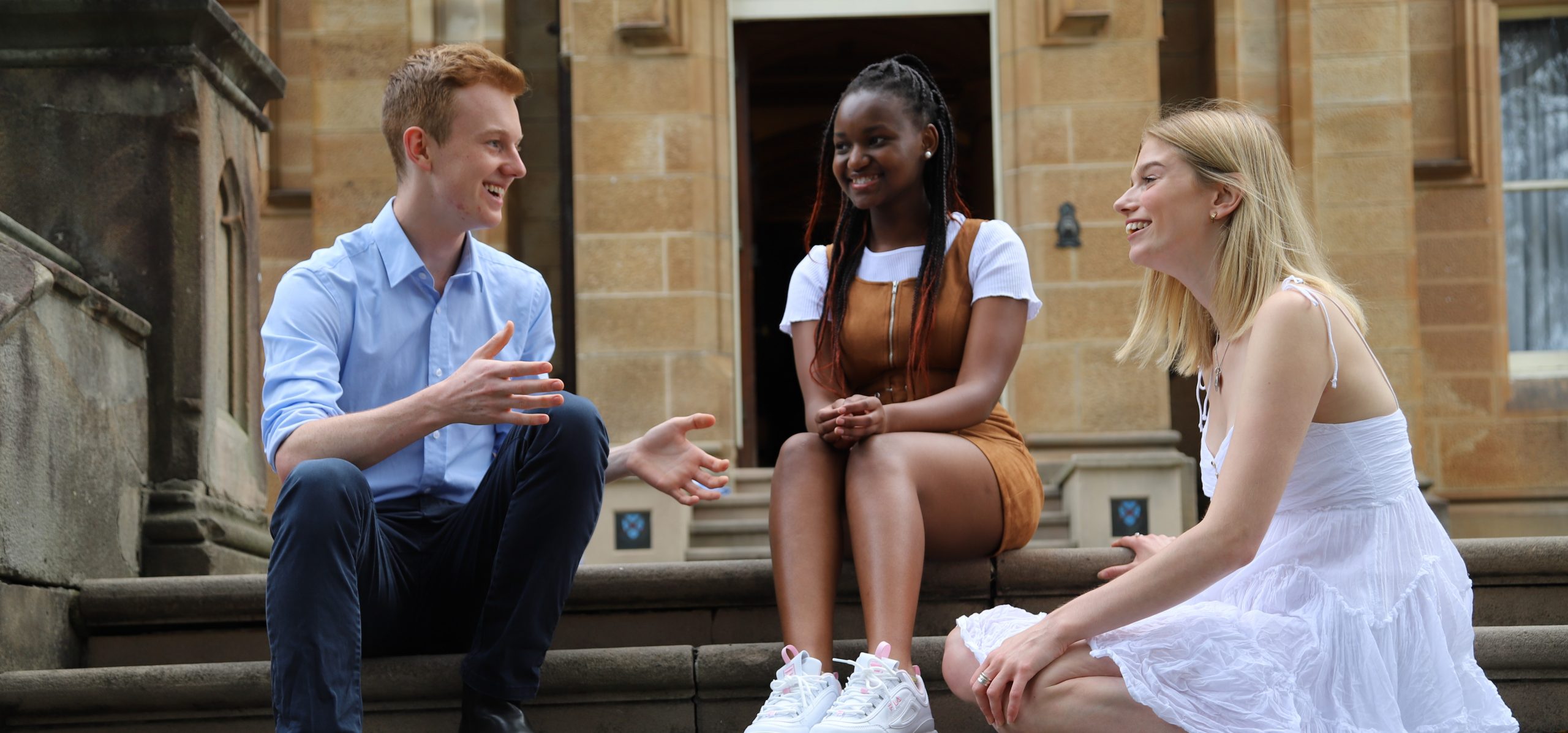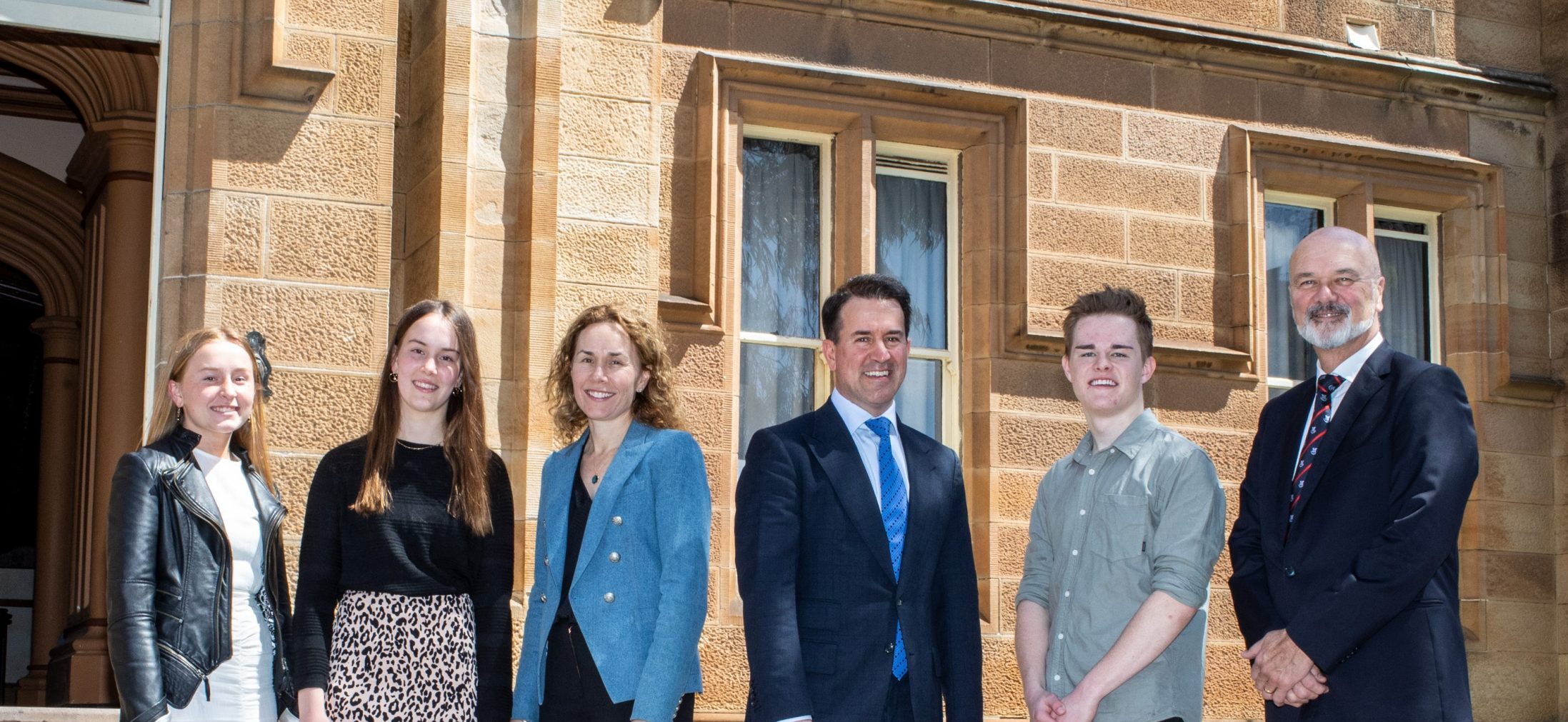Contact Us
Tel: +61 (2) 9565 7300
Scholarships

Living at St Andrew’s is an expensive proposition for many students and their families. The College Council recognises the need for financial assistance, and with the help of philanthropy, currently offers up to $2 million in scholarships, bursaries and prizes each year, the most generous scholarship program in Australian colleges. This financial assistance program provides fee relief, via means-tested scholarships, to students who could not otherwise afford to live at St Andrew’s and have the full College and university experience.
Help us provide Access to Andrew’s
Our aim is to significantly increase St Andrew’s scholarship funds to enable the College to attract and retain a diverse range of students who will benefit from and contribute to the St Andrew’s experience.
The College has taken the lead, perhaps more than any other, in encouraging strong diversity within its community. It aims to strengthen this by building an inclusive community that enriches academic and all-round high performance.
Many talented students, particularly from government schools and rural and regional areas, do not even consider College or university in Sydney as an option due to their financial constraints. Scholarships are pivotal in giving students from a diverse array of backgrounds the opportunity to dream big, pursuing pathways and careers that may never otherwise be possible.
Our Scholarship Objective:
- In addition to increasing our established scholarship funds, the College aims to establish new major scholarships which will help attract and support our diverse student body.
What impact would increasing these funds have?
Increased scholarship and bursary funds would:
- Allow St Andrew’s to welcome the most talented students, irrespective of their cultural, geographic or socio-economic backgrounds
- Enable the College to attract and support deserving students more adequately
- Allow students to work fewer hours in paid employment and focus more on their studies and College life
- Support the continued diversity of the student body which is essential for the intellectual and cultural strength of our College community
Nimalan Sundaram, a recipient of the Taylor Scholarship in 2017, used his scholarship as an opportunity to give back to the St Andrew’s Community. Click here to read about his experiences.

How you can make a difference:
“I will be forever grateful for my scholarship. Being from country NSW and living on a farm, times have been tough. But your consideration and generosity has allowed me to step outside my comfort zone and come to the city. I have absolutely loved every moment. I really hope one day that I can do what you have done, and allow someone to experience College, if they could not afford it themselves.”
– Charlotte, Rural & Regional Scholarship Recipient
You can make a one-off or annual gift to our Annual Giving Appeal, or to one of our College Scholarships Funds which provide Rural & Regional Scholarships, Government School Student Scholarships, Indigenous Scholarships, Graduate Student Scholarships and General Scholarships.
Additionally, you can establish a named scholarship in perpetuity or support an annual named scholarship over 3 – 5 years. To find out more, read some of the frequently asked questions (FAQs) on scholarships below or contact the Director of Advancement, Hannah Atwell, via E: advancement@standrewscollege.edu.au or T: +61 2 9565 7303
We are currently focused on increasing funds for the following scholarships:
- Rural & Regional Scholarships
Our rural and regional scholarships are established to improve access and educational opportunities for regional and remote Australians, who, without the scholarship, would not have the financial means to attend College. More than half of the student body are from rural and regional Australia, but make up over 60% of the applications for financial support. - First Nations Scholarships
The First Nations Scholarship Fund was established by the College Foundation in 2009 as a means to offer fee relief to students of Aboriginal and Torres Strait Islander background. The scholarships aim to open doors for marginalised First Nations students to access high-quality education at tertiary level and accommodation in the supportive community setting of College, whilst giving them the tools and confidence to take full advantage of the opportunities before them. If an Indigenous student is eligible to receive ABSTUDY to cover their College fees, the College will instead offer a smaller scholarship to assist with study resources such as textbooks and course materials. - Government School Student Scholarships
These scholarships are awarded to students from Australian Government Schools, who would otherwise not have the financial means to attend College.
Why are scholarships and bursaries so important?
Scholarship and bursary funds are vital to attract and retain a diverse group of students at St Andrew’s. Our College has a strong commitment to creating a diverse College community of students from a wide range of disciplines, locations, backgrounds, cultures and beliefs.
How many scholarships and bursaries does St Andrew’s have?
The College has more than 130 scholarships and bursaries to recognise academic, cultural and sporting excellence and to provide fee relief to students with demonstrated financial need.
Scholarships are available for students in every year level and from every faculty. There are specific scholarships for many subject areas, for instance law, as well as for students from specific backgrounds (e.g. Indigenous, rural & regional, government schools).
Bursary support is based solely on an assessment of demonstrated financial need.
Who is eligible for Financial Assistance?
All students are encouraged to apply as needs-based scholarships are distributed to both new and returning students.
How is a scholarship or bursary established?
Scholarships and Bursaries are set up in various ways: as a fund in perpetuity, as a fund for a specified number of years (usually three to five) or via a pledge with annual gifts. In consultation with the College and donor, guidelines are drafted to outline specific requirements relating to the scholarship.
With academic merit or potential and financial need often a key criterion, scholarship and bursary funds are carefully developed to allow for changing tertiary requirements and courses. Scholarships can be for new or returning students, undergraduates or graduates, students from different faculties (e.g. medicine, law), students from geographical locations (e.g. rural) or backgrounds (e.g. Indigenous).
Gift Agreements are developed and considered by the College Council, before being formally adopted.
What level of funding is required to establish a scholarship in perpetuity and how is it managed?
The current recommended minimum endowment to set up a scholarship is $160,000. This would provide around $8,000 pa in perpetuity.
The corpus amount is invested and managed via the St Andrew’s College Foundation overseen by the College’s Investment Committee and audited annually. Currently, in line with global best practice, St Andrew’s distributes 5% of the corpus annually. With careful fund management this ensures that the real value of the endowment is maintained over time, that there is some growth to allow for inflation and the rising costs of College residence, and the scholarship remains in perpetuity.
How much is required for non-endowed scholarships?
The current recommended minimum for an annual scholarship is $10,000 pa for a minimum of three years to provide continuity and financial security to students. Annual gifts need to be provided by the end of February each year to ensure we have the necessary funds to support students at the start of the academic year and in line with the College’s fee billing cycle.
How are donors kept informed?
The College wishes to honour its benefactors and also recognises the importance of keeping donors and their families informed about their scholarship and recipients.
Each year, prior to the University & Schools Dinner in May, donors are notified of the annual recipient of their Scholarship. Benefactors are also invited to the University & Schools Dinner and annual Founders’ & Benefactors’ Dinner where they are given the opportunity to meet scholarship recipients. Alternatively, meetings between individual benefactors and their scholarship’s recipient are easily arranged. For endowed funds, an annual update to the donor or their nominated representative provides details of the fund balance.
If you would like more information about establishing or contributing to a scholarship, please contact Hannah Atwell, Director of Advancement on:
- +61 2 9565 7303
- advancement@standrewscollege.edu.au

Current Named Scholarships
We are delighted to have several named endowed and annual scholarships as a result of the generosity of members of our community:
Endowed Scholarships:
- Geoffrey White Scholarship for Medicine
Professor Geoffrey White AM (Fr 1970) was a world-renowned pioneer in the field of Vascular Surgery. A leader in changing long surgical incisions and dissections for far less invasive surgery, he helped vastly improve the survival rates of patients. This scholarship was established in 2016 to honour the legacy of Geoffrey White, and is awarded to a student studying medicine. - The Plaskitt Family Scholarship
This scholarship was established in 2017, by Peter (Fr 1958) and Libby Plaskitt. The scholarship is to support two students, one from west of the Great Dividing Range in NSW, and one from New Zealand, with a preference to the South Island. These two areas are special to the Plaskitt family as Peter is originally from Quirindi NSW, and the family have had a holiday home in Queenstown for over 20 years. Since these places have given them many good memories, they felt the scholarship should reflect this. - Donald Jamieson Scholarship
Established in 2009 by Don Jamieson (Fr 1954), this scholarship is awarded to a University of Sydney student from country NSW, studying either Engineering or Science. Consideration is given to the student’s family means, and superior secondary school achievement. - The Alumni Society Scholarship
Awarded by the St Andrew’s College Alumni Society, this scholarship is awarded to a number of undergraduate students for their contributions to the life of the College, or to the special skill of the recipients. Service to the Students’ Club House Committee, and academic achievement of the student are also considered. - WRD Stevenson Scholarship
Established by Mrs R Stevenson in 2000 in memory of her husband, William Robert Stevenson (Fr 1932) and awarded to assist a Law student at St Andrew’s College. - The Senior Scholars Scholarships (formerly the Taylor Scholarships)
Established in 2015 by alumnus and former Chair of Council, Charlie Taylor (Fr 1982, SS 1985), to support fourth and fifth year students to develop a project that contributes to College life. - Nick Carson Prize in Law
Established in memory of Nick Carson (Fr 1959), this prize is awarded to a resident studying at the Sydney Law School (Faculty of Law), who has maintained a distinction average throughout their degree. - Thyne Reid Trust Scholarship
Established in 1977. An all-round Merit Scholarship awarded for the length of the student’s degree and on the basis of results obtained in Year 12 or equivalent examinations.
Annual Scholarships:
- Mostyn Family Foundation Scholarship
Established in 2018 with a gift from the Mostyn Family Foundation, this half-fee scholarship is awarded to a first year student demonstrating high academic ability, a willingness to contribute to College life, and whose background contributes to the diversity of the student body. - Tony Damian Scholarship
- Established in 2015 by alumnus Anthony Damian (Fr 1990), this scholarship is to support a student from rural or regional Australia to attend College.
- Thyne Reid E12 Scholarships
Established in 2015 as a combined scholarship between the University of Sydney, the Country Education Foundation and the Thyne Reid Foundation. Awarded to a number of students from rural or regional Australia. - Country Education Foundation
Established in 2015 as a collaboration between CEF and St Andrew’s College scholarships to assist rural and regional students, who, without the scholarship, would not have the means to attend College. - The David Anstice Rural & Regional Annual Scholarship
Established in 2020 by alumnus David Anstice (Fr 1966) this scholarship will provide full fee relief to a St Andrew’s College student from rural or regional Australia who is studying at the University of Sydney. The recipient will be an all-rounder capable of adding value to College Life and for whom the College experience will enhance their life’s journey as well. - Halliday Rural & Regional Scholarship
This annual scholarship was established in 2019 by Alexander Halliday (Fr 1965) to support two undergraduate students from rural & regional Australia who are all-rounders, capable of adding value to College Life and for whom the College experience will enhance their life’s journey. - Wines Family Medical Scholarship
This scholarship was established in 2020 by Andrew Wines (Fr 1988, SS 1991) and his family. It will support a St Andrew’s College student studying medicine or pre-medicine each year on the basis of academic excellence, contribution to Leadership in School or College and University Life and who would not otherwise be able to afford to come to College. - Adam Casselden SC Scholarship
Established in 2020 by alumnus and College Councillor, Adam Casselden SC (Fr 1990), this scholarship will support student who is from Rural & Regional Australia and attends a public or Government School.
The Impact of Giving
Click below to read the impact philanthropy has had in the St Andrew’s Community
Apply for Scholarships
Click below for the current scholarships that St Andrew’s offers, many the result of generous community philanthropy.
